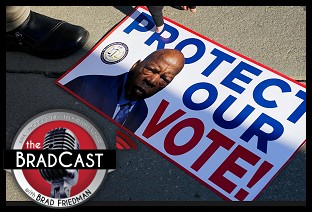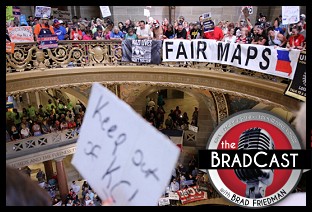 On today's BradCast: The ongoing GOP effort to undermine American democracy by making it harder to vote and easier to cheat in elections continues amid the fallout from Trump's attempt to steal the 2020 election. While you might think Republicans would pay a price for joining him in that effort, its Democrats --- and voters in general and American democracy itself --- paying the price, even as the Big Lie continues to fall further apart with each passing day. [Audio link to full show follows this summary.]
On today's BradCast: The ongoing GOP effort to undermine American democracy by making it harder to vote and easier to cheat in elections continues amid the fallout from Trump's attempt to steal the 2020 election. While you might think Republicans would pay a price for joining him in that effort, its Democrats --- and voters in general and American democracy itself --- paying the price, even as the Big Lie continues to fall further apart with each passing day. [Audio link to full show follows this summary.]
As you know, Republicans have been using false claims of massive (and, apparently, evidence-free) "voter fraud" in the 2020 election as a pretext to adopt new voter suppression and election subversion laws in GOP controlled states. The fruits of those corrupt efforts are already paying off. In Texas, for example, County Clerks across the state are reporting that the state's new anti-voting law, S.B.1, is forcing them to reject hundreds of legitimate absent ballot applications in one of the most difficult states in the nation to vote by mail already.
New I.D. requirements for ballot applications have resulted in rejections of nearly half of the absentee applications in Travis County, home to the state's capital of Austin. Worse, the state's Secretary of State has yet to issue rules for how County Clerks may legally notify or help the rejected voters to cure their applications in advance of the state's March mid-term primaries. (The application deadline is Feb. 18.)
Many of the rejected applications are from voters that have been voting by mail for years. But the new state law now requires applicants to include either a drivers license number or state I.D. number or the last four digits of their Social Security number on the application. While some don't notice the new requirement and are rejected on that basis, others do include one of those numbers, but are still being rejected! Why? As Democrats had warned when trying to block the bill, the TX law now requires that whichever number a voter uses on their application must match the number on their voter registration form, many of them completed years ago. If the voter includes a drivers license number on their application, for example, but their registration includes a State I.D. number instead --- or no number at all (as is the case with millions of voter registrations in the Lone Star State) --- their applications must now be rejected. Mission accomplished?
Meanwhile, the GOP's Big "voter fraud" Lie continues to fall apart in Arizona, where Joe Biden has been confirmed many times over to have lawfully defeated Trump in 2020. On Friday, in the second largest county in the state, Pima (home to Tucson), the Pima County Attorney's Office determined that, of the 151 cases referred to them as possible cases of voter fraud after 2020, ZERO actually merited criminal charges. There remain a handful of possible fraud cases elsewhere in a the state (less than 50). But, of course, if all known cases of possible fraud in Arizona turned out to be actual fraud and all of those votes were somehow in favor of Biden, there still wouldn't be nearly enough fraudulent ballots to reverse his 10,000+ vote victory out of about 3.2 million ballots cast in the state. Nonetheless, in AZ as well, Republicans are using their lies about "voter fraud" to make it harder to vote and easier for them to cheat in elections.
But the biggest story on today's BradCast involves gerrymandering, perhaps the most critical reason our federal government and our democracy has become so seemingly irreparably broken. Democrats in the U.S. Senate this week have combined the combined Freedom to Vote Act (which, among many other critical election reforms, makes partisan gerrymandering unlawful in all 50 states) and the John Lewis Voting Rights Advancement Act (which restores the requirement for federal pre-clearance of new election laws in states with a history of racial discrimination in elections after SCOTUS gutted the landmark provision) into one single bill called the Freedom to Vote: John R. Lewis Act. All 50 Democrats in the majority claim to support the newly combined bill. Zero Republicans do. But unless two Democratic Senators (Sinema and Manchin) agree to modify the Senate filibuster rule to allow democracy-saving legislation to be adopted with a simple majority vote, none of it will become law and the GOP efforts to game elections will be largely free and clear through 2022.
For several years, experts have been warning that, following the 2020 Census, the new round of redistricting was going to be very bad for Democrats in GOP-controlled states. That, after the U.S. Supreme Court gutted the Voting Rights Act in 2013 and later declared that federal courts may have no say at all on the issue of partisan gerrymandering, But, with about half of the new maps now redrawn by states in advance of the 2022 mid-terms (with several being challenged in state courts), are they as bad as many pundits had foretold?
A number of redistricting experts of late have suggested that the new maps aren't nearly as bad for Dems as they might have been. But is that true? We're joined today by Brennan Center's Senior Counsel for its Democracy Program, MICHAEL LI, who serves as the non-partisan organization's redistricting expert.
Last week, in an op-ed for Washington Post, Li describes the notion that gerrymandering hasn't been too bad for Democrats this year as a "misleading narrative" for a host of reasons. Experts, he notes, had predicted a bunch of safe Democratic seats would be remapped into Republican districts. "They expected Democratic seats to fall," Li explains. "But instead, what Republicans are doing is shoring up the disproportionate advantages they already hold" following the extreme partisan gerrymanders from 2011.
"In Texas, under the old maps, Democrats have 36% of the seats. Under the new maps they have 37% of the seats, so very little change," he tells me by way of just one example. "But the competition is gone. So whereas under the old maps there were competitive districts, under the new maps, even if Democrats got 58% of the vote [across the state], they would still have the same 37% of the seats, which hardly seems fair. Even if Texas turned deep blue, Republicans would have almost a 2-to-1 advantage. That's the perniciousness of the state's gerrymander."
There are other examples, in North Carolina for instance, where the maps are currently being challenged in state courts. We also discuss how the Supreme Court's unwillingness to hear partisan gerrymandering cases has affected all of this and whether or not the Court will similarly begin to turn away racial gerrymander cases as well in the not too distant future.
Li goes on to explain why the Freedom to Vote: John R. Lewis Act --- if Republicans or Manchinema were to allow it to be passed into law --- "would be a game-changer" on this issue. It "would transform redistricting. There would be a ban against partisan gerrymandering in Congressional redistricting. It would be easy to calculate and figure out whether a map violates that and, if a map does, then it's blocked from use pretty automatically, perhaps even in time for 2022 if Congress were to pass it soon."
But, alas, unless there are some surprises in the Senate this week, the bill is unlikely to pass anytime soon. So, what's left? Should Democratic-controlled states, in order to save democracy itself before the 2024 elections, gerrymander their own maps as aggressively as Republicans have? As much as it pains me to do so, I have previously argued that they should. Does Li agree? Tune in to find out!
Finally, before we go, the mid-show breaking news that Rudy Giuliani and a number of others who were very close to the disgraced former President as he was attempting to steal the 2020 election have now been subpoenaed by the House Select Committee investigating the January 6th attack on the U.S. Capitol...
(Snail mail support to "Brad Friedman, 7095 Hollywood Blvd., #594 Los Angeles, CA 90028" always welcome too!)
|


 A Pretty Weak 'Strongman': 'BradCast' 10/30/25
A Pretty Weak 'Strongman': 'BradCast' 10/30/25 'Green News Report' 10/30/25
'Green News Report' 10/30/25
 Proposal for 'First Politically Viable Wealth Tax' Takes Shape in CA: 'BradCast' 10/29/25
Proposal for 'First Politically Viable Wealth Tax' Takes Shape in CA: 'BradCast' 10/29/25 Monster Storm, Endless Wars, Gamed Elections:
Monster Storm, Endless Wars, Gamed Elections: 'Green News Report' 10/28/25
'Green News Report' 10/28/25 Let's Play 'Who Wants
Let's Play 'Who Wants Sunday 'Cartoonists Dilemma' Toons
Sunday 'Cartoonists Dilemma' Toons Exiled NOAA Scientists Resurrect Critical Disaster Database: 'BradCast' 10/23/25
Exiled NOAA Scientists Resurrect Critical Disaster Database: 'BradCast' 10/23/25  'Green News Report' 10/23/25
'Green News Report' 10/23/25 Trump-Allied GOP Partisan Buys Dominion Voting Systems: 'BradCast' 10/22/25
Trump-Allied GOP Partisan Buys Dominion Voting Systems: 'BradCast' 10/22/25 Trump, Republican Law(lessness) & (Dis)Order: 'BradCast' 10/21/25
Trump, Republican Law(lessness) & (Dis)Order: 'BradCast' 10/21/25 'Green News Report' 10/21/25
'Green News Report' 10/21/25 Celebrating 'No Kings': 'BradCast' 10/20/25
Celebrating 'No Kings': 'BradCast' 10/20/25 Sunday 'How It Started' Toons
Sunday 'How It Started' Toons SCOTUS Repubs Appear Ready to Gut Rest of Voting Rights Act: 'BradCast' 10/16/25
SCOTUS Repubs Appear Ready to Gut Rest of Voting Rights Act: 'BradCast' 10/16/25 'Green News Report' 10/16/25
'Green News Report' 10/16/25 The 'Epstein Shutdown' and Other Autocratic Nightmares: 'BradCast' 10/15/25
The 'Epstein Shutdown' and Other Autocratic Nightmares: 'BradCast' 10/15/25 Group Vows to Block MO's GOP U.S. House Gerrymander: 'BradCast' 10/14/25
Group Vows to Block MO's GOP U.S. House Gerrymander: 'BradCast' 10/14/25 Trump Labor Dept. Warns Trump Policies Sparking Food Crisis: 'BradCast' 10/9/25
Trump Labor Dept. Warns Trump Policies Sparking Food Crisis: 'BradCast' 10/9/25 Trump's Losing Battles: 'BradCast' 10/8/25
Trump's Losing Battles: 'BradCast' 10/8/25 Trump, Roberts and His Stacked, Packed and Captured SCOTUS: 'BradCast' 10/7/25
Trump, Roberts and His Stacked, Packed and Captured SCOTUS: 'BradCast' 10/7/25 Trump Attempting His 'Invasion from Within': 'BradCast' 10/6/25
Trump Attempting His 'Invasion from Within': 'BradCast' 10/6/25 Biden Budget Expert: Mass Firings in Shutdown 'Illegal': 'BradCast' 10/2/25
Biden Budget Expert: Mass Firings in Shutdown 'Illegal': 'BradCast' 10/2/25 Why is DOJ Suing 'Blue' States for Their Voter Databases?: 'BradCast' 10/1/25
Why is DOJ Suing 'Blue' States for Their Voter Databases?: 'BradCast' 10/1/25
 VA GOP VOTER REG FRAUDSTER OFF HOOK
VA GOP VOTER REG FRAUDSTER OFF HOOK Criminal GOP Voter Registration Fraud Probe Expanding in VA
Criminal GOP Voter Registration Fraud Probe Expanding in VA DOJ PROBE SOUGHT AFTER VA ARREST
DOJ PROBE SOUGHT AFTER VA ARREST Arrest in VA: GOP Voter Reg Scandal Widens
Arrest in VA: GOP Voter Reg Scandal Widens ALL TOGETHER: ROVE, SPROUL, KOCHS, RNC
ALL TOGETHER: ROVE, SPROUL, KOCHS, RNC LATimes: RNC's 'Fired' Sproul Working for Repubs in 'as Many as 30 States'
LATimes: RNC's 'Fired' Sproul Working for Repubs in 'as Many as 30 States' 'Fired' Sproul Group 'Cloned', Still Working for Republicans in At Least 10 States
'Fired' Sproul Group 'Cloned', Still Working for Republicans in At Least 10 States FINALLY: FOX ON GOP REG FRAUD SCANDAL
FINALLY: FOX ON GOP REG FRAUD SCANDAL COLORADO FOLLOWS FLORIDA WITH GOP CRIMINAL INVESTIGATION
COLORADO FOLLOWS FLORIDA WITH GOP CRIMINAL INVESTIGATION CRIMINAL PROBE LAUNCHED INTO GOP VOTER REGISTRATION FRAUD SCANDAL IN FL
CRIMINAL PROBE LAUNCHED INTO GOP VOTER REGISTRATION FRAUD SCANDAL IN FL Brad Breaks PA Photo ID & GOP Registration Fraud Scandal News on Hartmann TV
Brad Breaks PA Photo ID & GOP Registration Fraud Scandal News on Hartmann TV  CAUGHT ON TAPE: COORDINATED NATIONWIDE GOP VOTER REG SCAM
CAUGHT ON TAPE: COORDINATED NATIONWIDE GOP VOTER REG SCAM CRIMINAL ELECTION FRAUD COMPLAINT FILED AGAINST GOP 'FRAUD' FIRM
CRIMINAL ELECTION FRAUD COMPLAINT FILED AGAINST GOP 'FRAUD' FIRM RICK SCOTT GETS ROLLED IN GOP REGISTRATION FRAUD SCANDAL
RICK SCOTT GETS ROLLED IN GOP REGISTRATION FRAUD SCANDAL VIDEO: Brad Breaks GOP Reg Fraud Scandal on Hartmann TV
VIDEO: Brad Breaks GOP Reg Fraud Scandal on Hartmann TV RNC FIRES NATIONAL VOTER REGISTRATION FIRM FOR FRAUD
RNC FIRES NATIONAL VOTER REGISTRATION FIRM FOR FRAUD EXCLUSIVE: Intvw w/ FL Official Who First Discovered GOP Reg Fraud
EXCLUSIVE: Intvw w/ FL Official Who First Discovered GOP Reg Fraud GOP REGISTRATION FRAUD FOUND IN FL
GOP REGISTRATION FRAUD FOUND IN FL

































